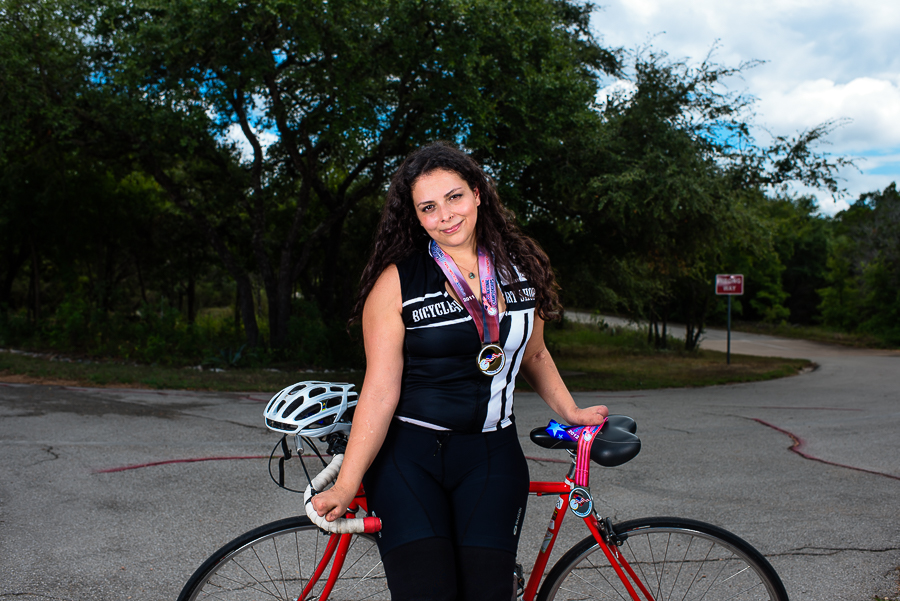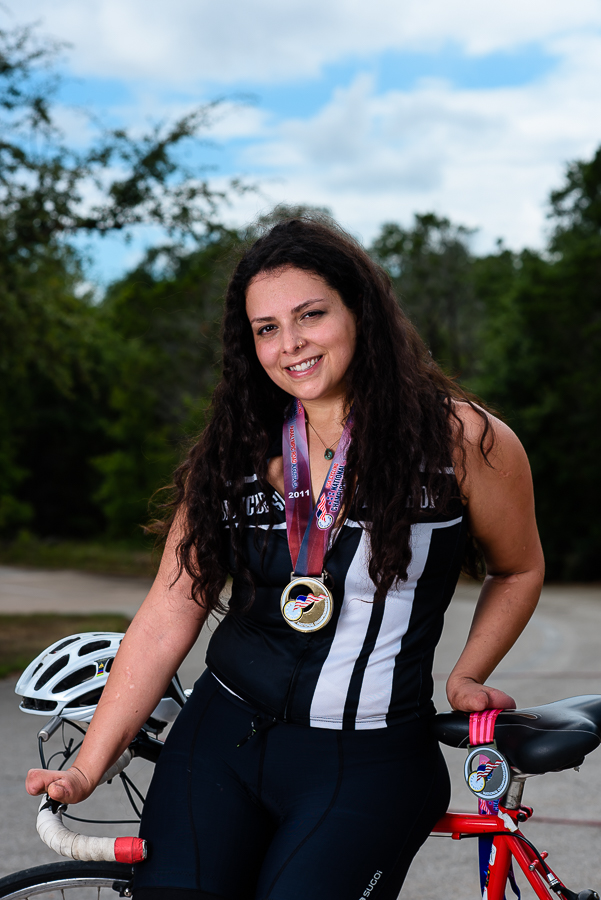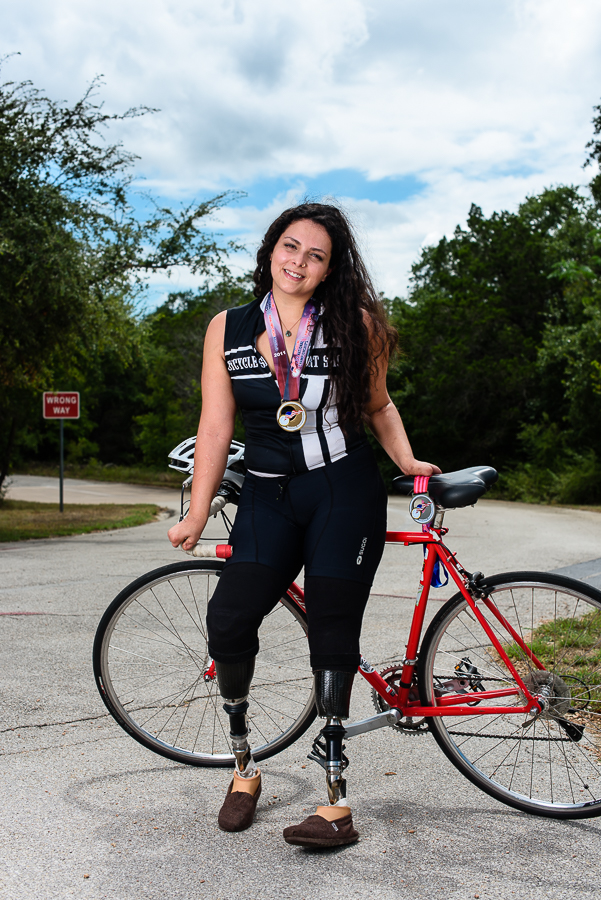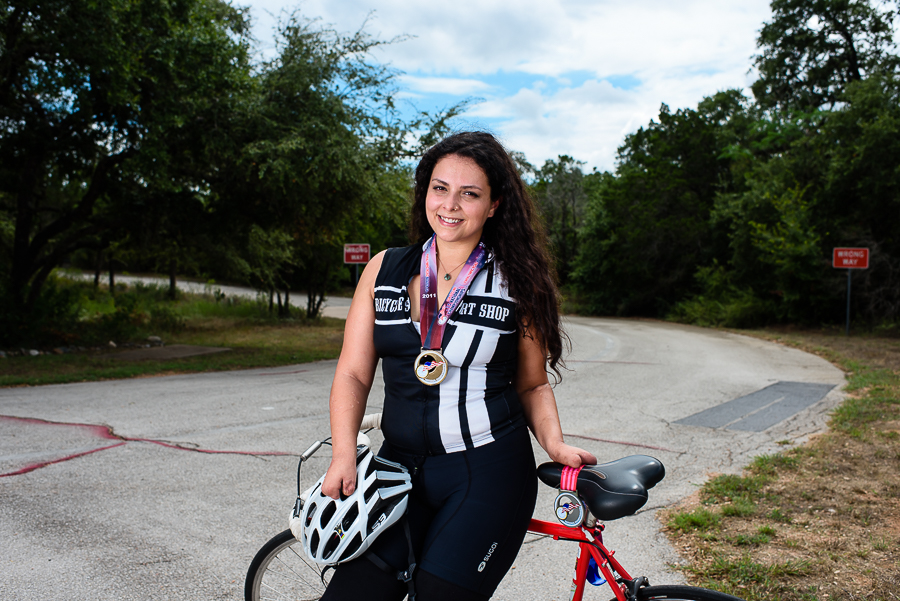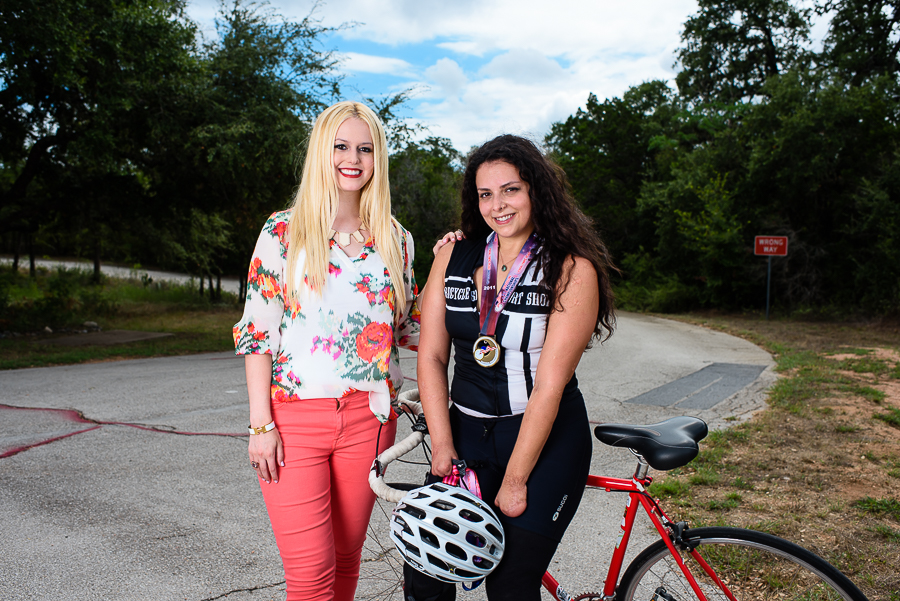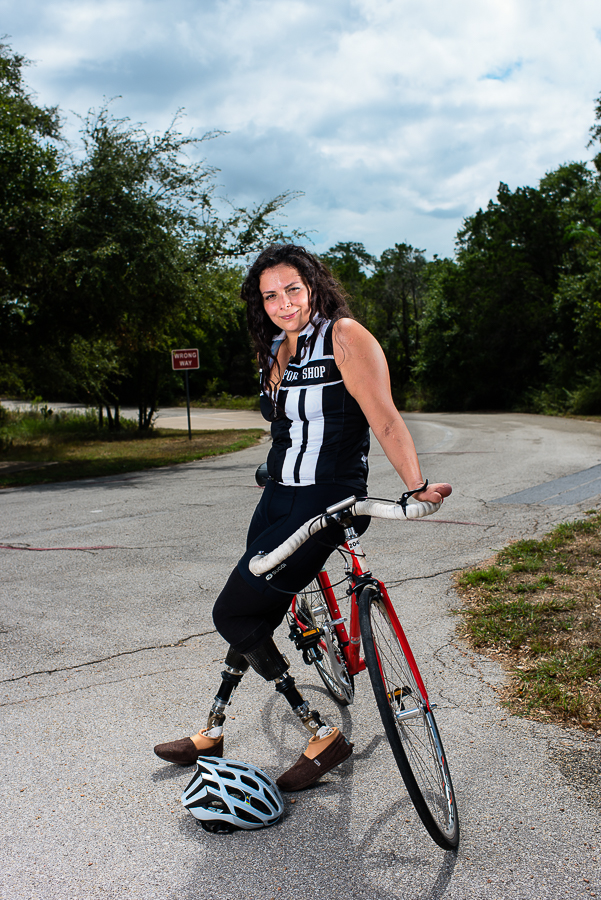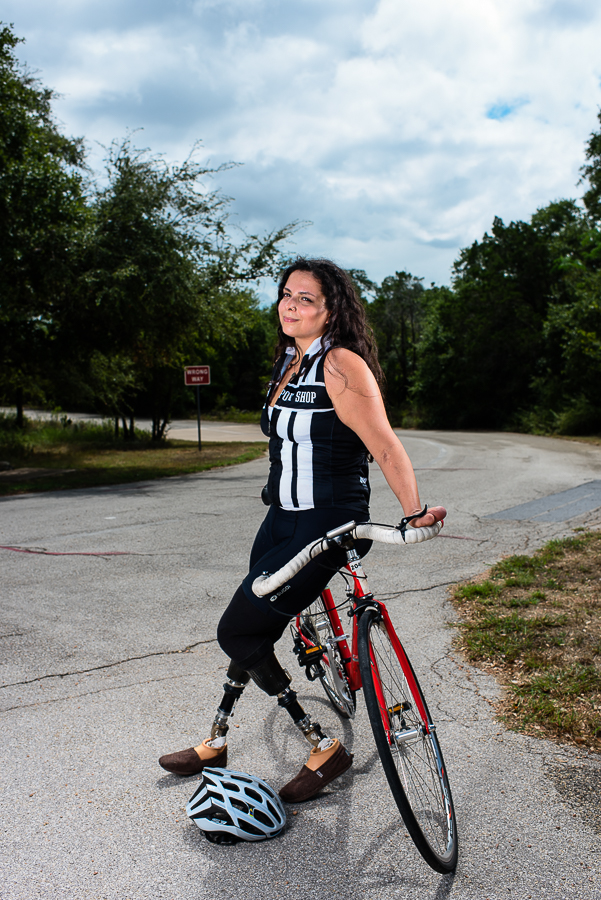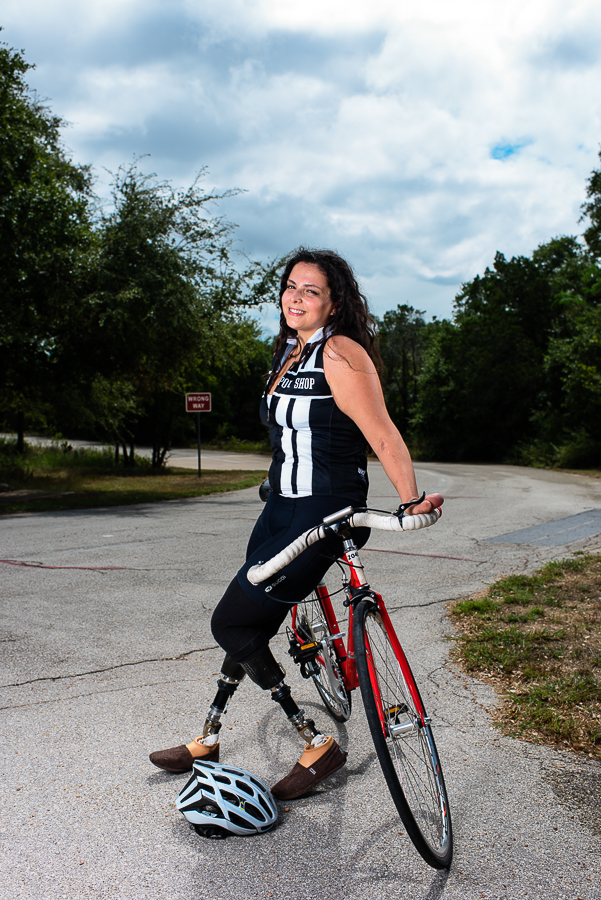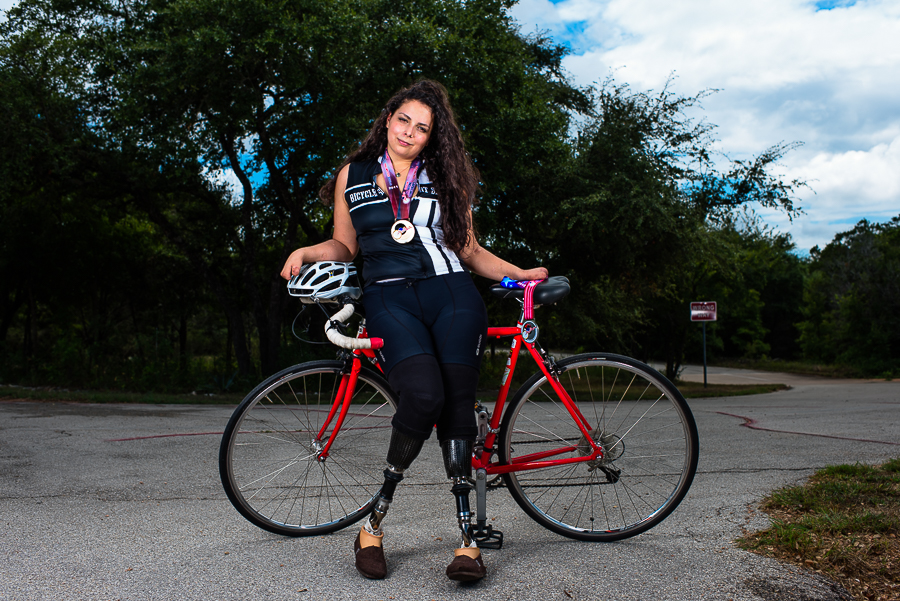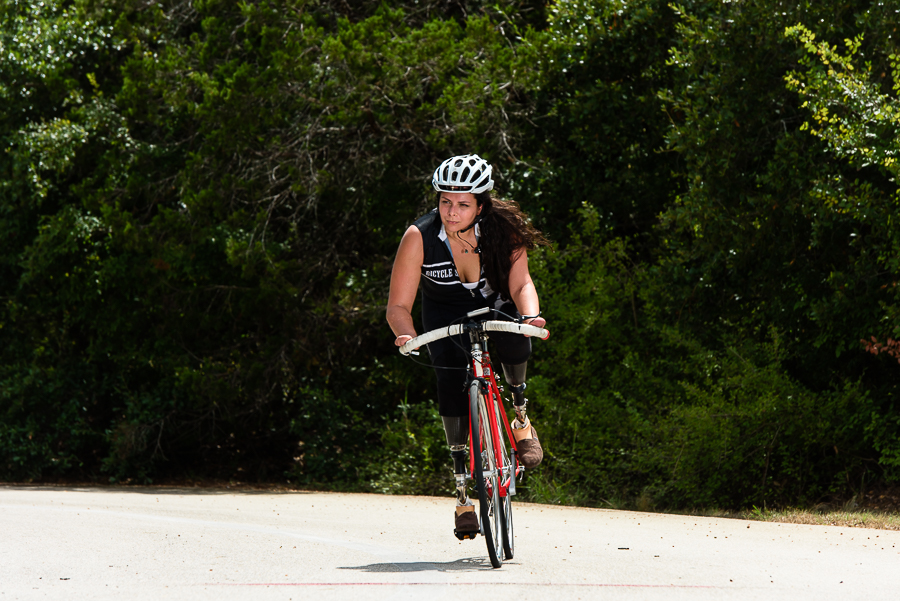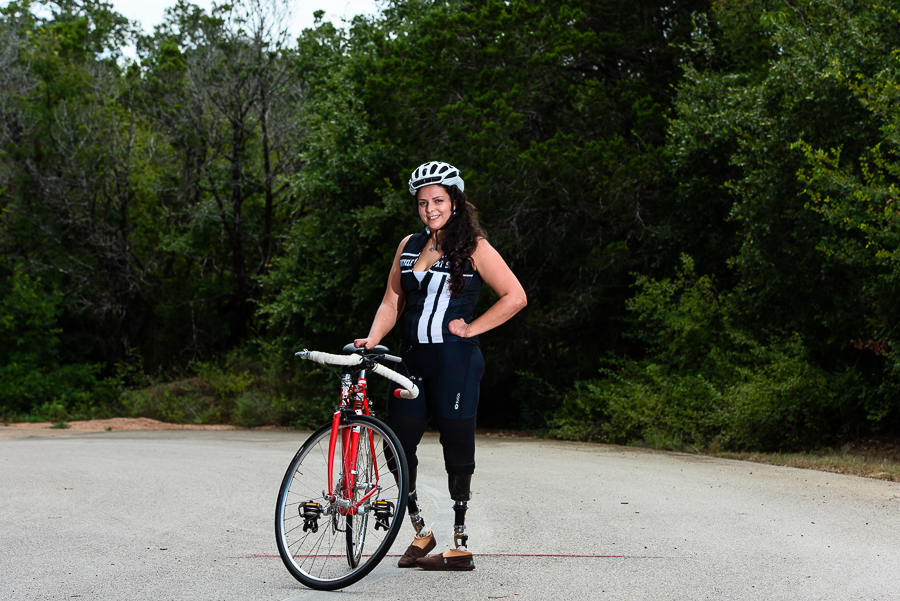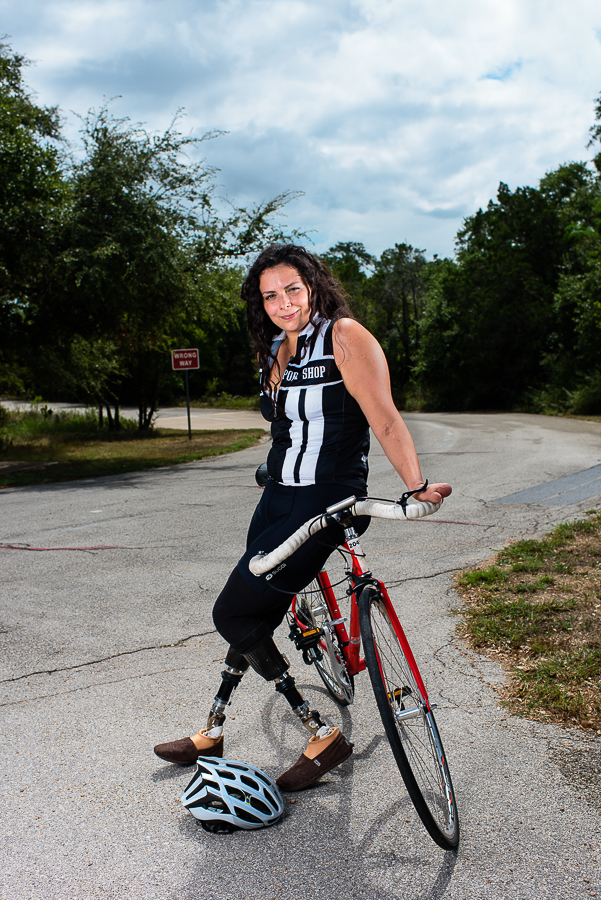There is nothing in this world that will stop Jamie Schanbaum. In 2008 she was diagnosed with meningitis, in 2009 she learned how to walk with her prosthetics, in 2010 she got on a bike for her first time, and by 2011 she was an internationally acclaimed cyclist. She has accomplished more than some will ever achieve in a lifetime.
“I got meningitis a month after turning 20” explains Schanbaum. She was hanging out at a friends’ house the night of November 13, 2008, when she started to feel nauseous. “I decided to take a nap there and before I knew it, I ended up spending the night. Everything got worse that night.” The next morning Jamie went back to her apartment. “I remember it was a beautiful day and the sun was shining into my apartment, but I felt awful. I couldn’t keep anything down. My feet were incredibly sensitive and I could barely walk and had to hold onto the walls.” Her sister came over and found Jamie sitting on the ground and thought it was asthma related. “She touched my legs and I reacted in a crazy way like, ‘don’t touch me that hurts!’”
Schanbaum and her sister then decided to go down the street to Seton Hospital. “Walking down my apartment took me 20 minutes. By the time I got to the hospital I needed a wheel chair. I don’t remember waiting and next thing I know there’s about 8 nurses around me asking me routine questions. I’m on the bed in fetal position shaking.”
“Over time I saw my limbs go from a red rash, to purple, to black. It looked like black socks and gloves were on my arms and legs. It was nuts, it’s sad in some ways, but important to share details. My fingers shriveled up like raisins. They hardened and when you touched them it sounded like metal hitting metal. I felt like I had thousands of pounds of sand inside me.”
Jamie stresses the importance of being vaccinated because, “meningitis is so commonly misdiagnosed.” When she was first admitted to Seton, one nurse had guessed that she had meningitis. “The common symptoms are a rash on your stomach, but I didn’t have that. I got lucky that a nurse guessed it.” Jamie’s limbs were so sensitive because her blood was becoming toxic and her body was shutting down. “There was no blood flow to my extremities and that’s why they were sacrificed in the end.”
The first day at Seton, doctors put her on dialysis, which cleans out your blood. “And then the next day I was on a ventilator which helps breathing. The next couple of weeks I was in a semi-medicated Acoma and don’t remember what happened.”
Jamie was transferred early December to St. Joseph’s Medical Center in Houston, TX to use hyperbaric chambers. “I was there because it was rejuvenating oxygen to my limbs since they were going to amputate above my knees and below my elbows.” Jamie says she was “surprisingly optimistic.”
“In the beginning, the doctors told my family it was going to be one toe, or one foot, and now its both feet, and now my hands. I heard that amputations were going to happen, and it didn’t really get serious until December when my mom and sister sat me down and said ‘[the amputations are] really going to happen’. That was one of my sadder moments.”
Schanbaum didn’t receive the amputations till February, three months later. “I was lying in a bed not moving, I couldn’t raise my arms over my head till January, and that was an accomplishment. It was hard to do, but when I did it, it was a big deal because I could give people hugs.”
“When I woke up [after the amputation], it was nuts, it was the worst day ever. I could just not move and I would be in an immense amount of pain. The pain didn’t get better for a while and I was just lying in bed. I remember waking up and looking down, when you’re in bed you see your feet pointing up. Imagine waking up and it’s not there anymore. It’s different. It’s something I’ve had since I was born and it was taken from me.”
Jamie demonstrates by drawing with a pen on my hand showing where they cut the amputation. She smiles and says, “I’m pretty functional for the most part.”
“I remember the first time I stepped out, and by stepped I mean wheeled out of the hospital, and I was so uncomfortable. It felt like I was studying abroad, I was so foreign from everything back home and you couldn’t come home. So when I left, I was like, ‘I’m actually going to leave’. It was my first time seeing outside of a hospital.
Jamie then spent 3 weeks at St. David’s Hospital doing inpatient and 6 months outpatient. It took her 3 months to learn how to walk on her prosthetics. At that point, she could walk without a walker.
“Around that time [April 2009] the bill was already being worked on and had possibly been passed. It was called the Jamie Schanbaum and Nicolis Williams Act.” It requires all college students entering any Texas university (on or off campus) to be vaccinated. Prior to this, the Jamie Schanbaum Act had made it mandatory for students who were living on campus to be vaccinated. Jamie had been living off campus.
“Nicolis Williams was a boy who was living off campus like me and got sick and was brain dead within 18 hours. His parents weren’t even able to get there in time to communicate with him. Three days later they took him off life support.” Schanbaum is good friends with his family and says, “I’m sure if I met him, I would’ve had a great relationship with him. He seemed like a great guy.”
“I urge the vaccine because meningitis isn’t something you’ll find out at a doctors office. Meningitis is something you find out when you’re at the hospital and wondering if you’re going to survive. The best way to protect yourself is through the vaccine.”
Before Jamie was diagnosed with meningitis, she had only visited four other states. Schanbaum has now visited over 35 states spreading awareness about meningitis and the vaccine. “Recently I was doing a speaking tour called ‘The Voices of Meningitis’ campaign which is put on by Sanofi Pasteur vaccines and National Association of School Nurses (N.A.S.N.). They collaborated together and produced The Voices of Meningitis campaign this year. They did a focus on music, and that’s where [“Pretty Little Liars” star] Lucy Hale came in because she’s had her own albums out. She does awareness [due to the fact that] her demographic is teens. The sole purpose of ‘Voices’ is to get the booster vaccine increased. Only 30% of the people who get their primary dose at the ages of 11 and 12 are getting their booster vaccine, which is the most important part of it.” Schanbaum also adds that Lucy Hale, “Is so great and so nice. I’m really happy that she’s doing this.”
Jamie has worked with Doctor Mark Blatter, who has stated that 10% of the population are carriers of meningitis. Schanbaum adds, “When you’re in school in a dorm on the second day, it bumps up to 35%, and after 5 days you’re at 100%, everyone is carrying the bacteria.”
When Jamie left the hospital, she had no idea what she would be doing next. She then met someone who told her he had amputee friends her age and rode their bikes and invited her to join. Schanbaum adds, “before I knew it, I was riding.” “I met a US Paralympics coach who was asking me about my adaptations and wanted to see how I could qualify for the USA cycling Paralympics team. Next thing I know, I’m winning [a gold medal] in my division for the road nationals in Augusta, Georgia.” Jamie also competed in the Pan American games in Guadalajara in 2011.
“When I got sick, there was a lot of depression and you know the question of why would this happen to me. But then this transitioned to why does this have to keep happening to others. That kind of started the whole initiative of not only the bill, but also the JAMIE group. I just want to make sure people are educated and aware of the disease.” The JAMIE group is a non-profit organization focused on spreading awareness. It stands for Joint Advocacy of Meningitis Information and Education: JAMIE. The group has been active for 6 years.
Jamie has had her picture taken by famous photographer Anne Geddes. “I do what I can to spread awareness in a local or national level, but this took it to a global level. Geddes took pictures of survivors of meningitis for the ‘Protecting Our Tomorrows’ campaign.’”
For fun, Jamie enjoys being an Uber and Lyft driver. “It’s something I’ve always wanted to do before Uber and Lyft were even around since I know the streets of Austin and I like talking to people. It’s fun! It’s great to be in Austin where the bill was passed and I went to UT where it’s mainly being affected. I pick up a lot of students and I tell them about meningitis. Everyone is always like ‘I had no idea meningitis could do this to you.’ Meningitis is the number one fastest killing diseases and has been for almost 100 years. It typically kills within 24 hours.”
Schanbaum hopes to release a book in the future sharing her story. “It’s so important to just talk to your doctor about meningitis. Don’t go look it up on a website. Go speak to your doctor about the vaccine even though it’s highly recommended for students, you can get meningitis at any age. So if you want to be protected, I say yes! I think it’s a good idea. As an advocate, I will be getting this vaccine the rest of my life. I want to be protected; I know babies and grandparents who have died from this disease.”
To learn more about Jamie and her story, visit her website: The JAMIE Group
Photography by John Pesina


